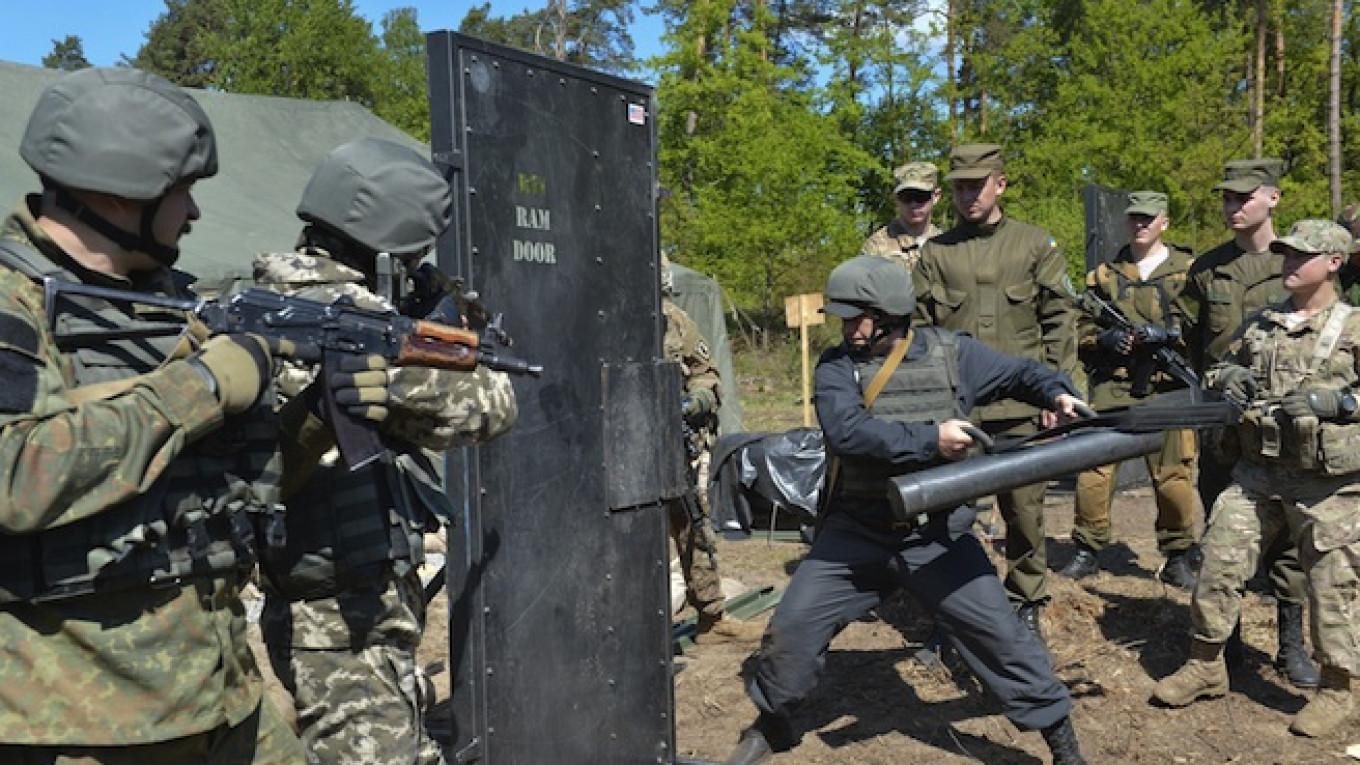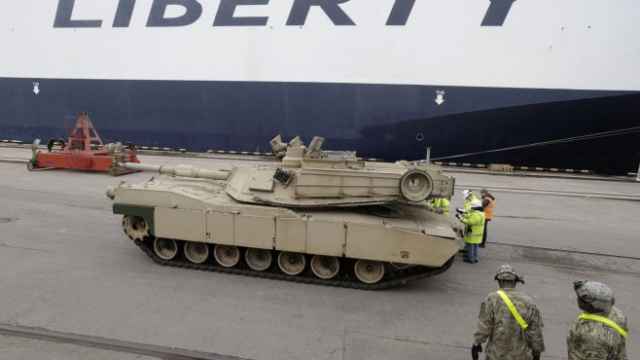YAVORIV — Tense Ukrainian soldiers with assault rifles creep stealthily around mock houses before bursting in to clear out gunmen, while others practice setting ambushes or infantry assaults, all under the watchful eyes of U.S. Army trainers.
Dotted around the vast, wooded Yavoriv military training area in western Ukraine, soldiers of the U.S. 173rd Airborne Brigade are instructing Ukrainian national guardsmen in techniques designed to help them in the simmering war against pro-Russian separatists hundreds of miles to the east.
Although Western countries have held back from military involvement in the conflict, the small-scale U.S. training effort, together with similar schemes set up by Britain, Canada and Poland, sends a signal to Russia that the West stands behind the Ukrainian government.
Kremlin spokesman Dmitry Peskov has said the U.S. training could destabilize eastern Ukraine.
That charge was dismissed by the commander of U.S. Army Europe, Lieutenant-General Ben Hodges, who visited Yavoriv on Monday with U.S. Deputy Assistant Defense Secretary Evelyn Farkas to see how training effort is going.
"I don't know how it could possibly be considered destabilizing … The big difference is that we are here at the invitation of the Ukrainian government. The Russians are in Ukraine at nobody's invitation," he told reporters.
Moscow denies accusations by Ukraine and NATO that it has sent soldiers and sophisticated weaponry to help the separatists in a conflict in which Ukrainian soldiers die almost daily despite a cease-fire agreed in February. More than 6,100 people have been killed since April 2014.
Russia stood by its denial, despite Kiev saying on Monday it had captured two Russian soldiers.
Gunmen in Tracksuits
In one area of the training ground, Ukrainian soldiers holding AK-74 assault rifles advanced before dropping down on one knee and taking aim, while elsewhere track-suited gunmen firing blanks posed as separatists in wooden frame "houses" built to practice urban warfare.
One of the U.S. trainers, Second Lieutenant Ty Boyle of the 173rd Airborne, said the Ukrainian reservists were taught everything from medical training to spotting improvised bombs, from searching buildings to close assault.
Although many of the Ukrainian soldiers have already fought in the east in what Kiev calls the ATO (anti-terrorist operation), Boyle says they are motivated to learn from the Americans and have noticeably improved in the four weeks of training so far.
"I definitely feel that we are setting up these soldiers … for success in the ATO," Boyle, a 27-year-old from Minnesota, told reporters.
Ukrainian company commander Vadym Perepichka, 26, who has spent almost a year fighting in eastern Ukraine, praised the training and said it would be a "great idea" if the program could be expanded.
"We learned many interesting things, but in particular what we liked was our camouflage class. We were able to learn [how to] mask ourselves where we could walk by five meters from a person and not be able to see him," he said, through a U.S. Army interpreter.
The U.S. training program, dubbed "Fearless Guardian," is scheduled to last six months, with three groups of about 300 Ukrainian soldiers each receiving eight weeks of training, with a focus on defensive, rather than offensive, techniques.
The United States, wary of getting involved in the Ukraine conflict, has turned down President Petro Poroshenko's requests for lethal aid, although it is supplying equipment such as vehicles, radios, patrol boats and counter-mortar radars.
The Ukrainian national guardsmen on the course, wearing a variety of kit, will be issued with uniforms, helmets, body armor and night vision goggles by the Americans, as well as Harris radios.
A Message from The Moscow Times:
Dear readers,
We are facing unprecedented challenges. Russia's Prosecutor General's Office has designated The Moscow Times as an "undesirable" organization, criminalizing our work and putting our staff at risk of prosecution. This follows our earlier unjust labeling as a "foreign agent."
These actions are direct attempts to silence independent journalism in Russia. The authorities claim our work "discredits the decisions of the Russian leadership." We see things differently: we strive to provide accurate, unbiased reporting on Russia.
We, the journalists of The Moscow Times, refuse to be silenced. But to continue our work, we need your help.
Your support, no matter how small, makes a world of difference. If you can, please support us monthly starting from just $2. It's quick to set up, and every contribution makes a significant impact.
By supporting The Moscow Times, you're defending open, independent journalism in the face of repression. Thank you for standing with us.
Remind me later.






